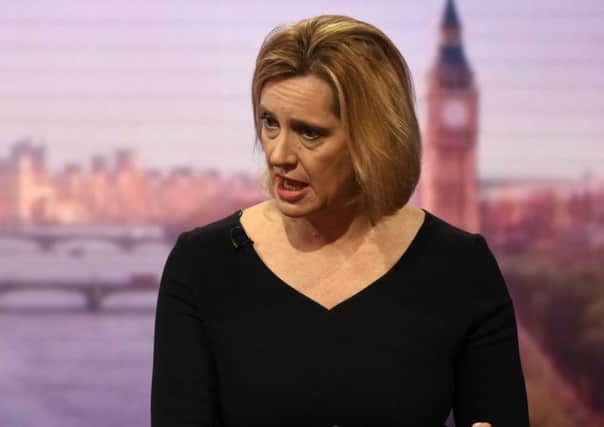YP Comment: Terrorism '“ which party will keep Britain safe?


It’s about who should be Foreign Secretary – Boris Johnson or Emily Thornberry?
It’s about who should be Chancellor – Philip Hammond or John McDonnell?
Advertisement
Hide AdAdvertisement
Hide AdAnd it’s about who should be Home Secretary entrusted with keeping this country safe – Amber Rudd or Diane Abbott?
Prime Ministers can’t do everything. They have to delegate and trust their Ministers. And, regrettably, the terrorist outrage in Manchester a week ago has brought the issue of national security into sharp focus.
Let it be said that the police have responded magnificently to the terror threat – and the public’s co-operation, and show of support for the security services at weekend events across the country, could not have been more sincere.
However the main parties are performing a disservice to voters, and the police, by resorting to personal attacks rather than focusing on the policy debate and their respective records. Both have questions to answer.
Advertisement
Hide AdAdvertisement
Hide AdFor Ms Rudd and the Tories, it is whether cuts to police numbers – and a diminution of the control orders first introduced by Labour’s David Blunkett – has made Britain less safe. The coalition’s role in overthrowing Libyan leader Muammar Gadaffi also created a vacuum that is said to have radicalised the Manchester suicide bomber Salman Abedi.
For Ms Abbott and Labour, it is whether the Home Office can be entrusted with a politicians who once signed a Commons motion calling for the abolition of the M15 intelligence agency; whose policing plans simply don’t add up and who does not seem embarrassed by past expressions of support for terrorist organisations like the IRA.
And, while Ms Abbott could not have been less convincing or reassuring, the point is this as the opinion polls narrow. The country should be hearing far more from those Ministers and Shadow Ministers who hope to be running the country after June 8. If they have a higher profile, it can only help undecided voters to make the right decision.
A national scandal
TORY turmoil over the ill-conceived ‘dementia tax’, which still has not dissipated a week after Theresa May’s manifesto climbdown, continues to detract attention away from wider failings in social care policy and, specifically, the ‘delayed discharge’ of elderly patients from hospital because there’s insufficient support available in local communities.
Advertisement
Hide AdAdvertisement
Hide AdA nationwide issue, it would be remiss not to hide the wide disparities in best practice. According to the King’s Fund think-tank, just 24 local authority areas account for 50 per cent of all cases. What does this say? It’s not just about money – it’s also about management and the ability of different health bodies to work together.
This is pertinent in the wake of today’s revelation pointing to a 138 per cent increase in ‘delayed discharges’ in Sheffield. To put this number in context, there were 48,000 wasted bed days last year – more than any other NHS trust in the country – when people could have been treated in hospital if it had been possible to release frailer patients. Irrespective of where blame lies, and regardless out of the outcome of the election, this state of affairs is scandalous and demands an urgent summit of Sheffield’s health chiefs to come up with a more effective remedy. NHS users deserve nothing less.
New chapter
THE return of water voles to Malham Tarn, England’s highest freshwater lake, will strike a chord with all those whose early years were illuminated by author Kenneth Grahame’s timeless book The Wind In The Willows.
In an adventure worthy of Ratty, Mole and Toad, three of the iconic characters created by the former secretary of the Bank of England as he sat by the River Thames, water voles are, once again, flourishing in North Yorkshire.
Advertisement
Hide AdAdvertisement
Hide AdTestament to the painstaking work of conservationists, this also speaks volumes about the extent to which Yorkshire’s waterways have been transformed in recent decades. It’s not so long ago that rivers, lakes and streams were so polluted that wildlife had little chance of surviving. Now, thanks in no small part to a book first published 109 years ago, there’s no chance of the clock being turned back as a new chapter is written about water voles.